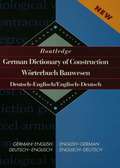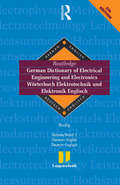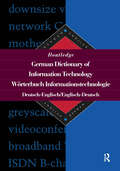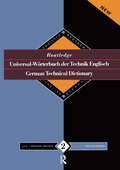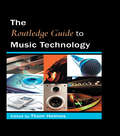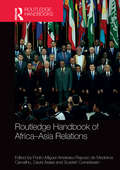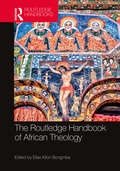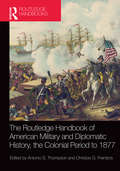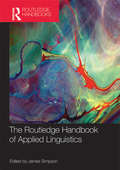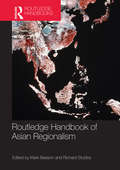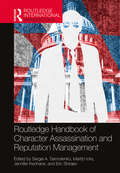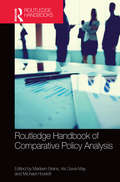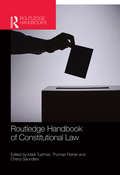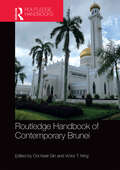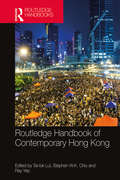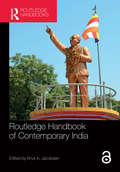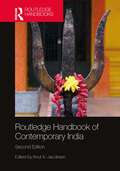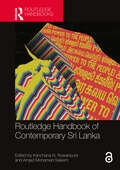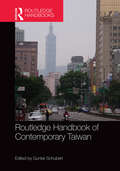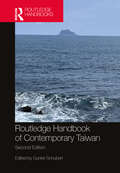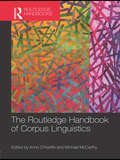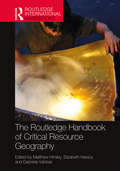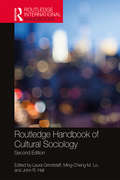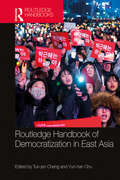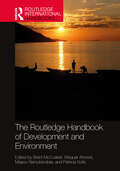- Table View
- List View
Routledge German Dictionary of Construction Worterbuch Bauwesen: German-English/English-German
by Wörterbuch BauwesenThis dictionary consists of some 25,000 entries in both German and English, drawn from all the major, as well as newly-developed areas in the fields of Construction including: Architecture & Building Design * Building Hardware & Interior Equipment * Building Machinery * Concrete Works * Construction Law & Building Contracts * Electronics * Environm
Routledge German Dictionary of Electrical Engineering and Electronics Worterbuch Elektrotechnik and Elektronik Englisch: Vol 1: German-English/Deutsch-Englisch 6th edition (Routledge Bilingual Specialist Dictionaries Ser.)
by Peter-Klaus BudigThis book presents the vocabulary of a continually evolving and fundamental technical field which is finding ever broad applications in industry. It provides special attention to the language of national and international standards and recommendations, as well as appropriate field indications.
Routledge German Dictionary of Information Technology Worterbuch Informationstechnologie: German-English/English-German (Routledge Bilingual Specialist Dictionaries)
by Sinda LópezThis thorough reference source is in-dispensible for translators working in the realms of artificial intelligence, computing, data processing, physics, online services and related disciplines. The dictionary also features hot translation links, indexed cross-references for easy, rapid access, and an intuitive screen environment while covering the most up-to-date terminology in this cutting edge subject area. Diese umfassende Referenzquelle ist für Übersetzer, die in den Bereichen künstliche Intelligenz, Informatik, Datenverarbeitung, Physik, Online-Dienste und verwandten Disziplinen arbeiten, unverzichtbar. Das Wörterbuch verfügt außerdem über „Hot Translation“-Links, indizierte Querverweise für einen einfachen und schnellen Zugriff sowie eine intuitive Bildschirmumgebung und deckt gleichzeitig die aktuellste Terminologie in diesem hochmodernen Themenbereich ab.
Routledge German Technical Dictionary Universal-Worterbuch der Technik Englisch: Volume 2: English-German/English-Deutsch (Routledge Bilingual Specialist Dictionaries)
by Sinda LópezThe German-English volume of this acclaimed dictionary covers some 60 subject areas, including in-depth treatment of fields such as: Mechanical Engineering * Transportation * Production Engineering * Electrical Engineering * Chemistry * Physics * Electricity * Construction * Food Technology * Railway Engineering * Automotive Engineering and more. Der deutsch-englische Band dieses renommierten Wörterbuchs deckt rund 60 Fachgebiete ab, darunter eine vertiefte Behandlung von Fachgebieten wie: Maschinenbau * Transportwesen * Produktionstechnik * Elektrotechnik * Chemie * Physik * Elektrizität * Bauwesen * Lebensmitteltechnik * Eisenbahntechnik * Fahrzeugtechnik und mehr.
The Routledge Guide to Music Technology
by Thom HolmesFirst published in 2006. This guide is an A to Z trade reference aimed at music students, technophiles and audio-video computer users. The world of music technology has exploded over the last decades thanks to introductions of new digital formats. At the same time there has been a renaissance in analog high fidelity equipment and resurgent interest in turntables, long playing records and vintage stereo systems. Music students, collectors and consumers will appreciate the availability of a guide to all things musical in the technological universe.
Routledge Handbook of Africa-Asia Relations
by Pedro Miguel Amakasu Raposo de Medeiros Carvalho, David Arase and Scarlett CornelissenThe Routledge Handbook of Africa–Asia Relations is the first handbook aimed at studying the interactions between countries across Africa and Asia in a multi-disciplinary and comprehensive way. Providing a balanced discussion of historical and on-going processes which have both shaped and changed intercontinental relations over time, contributors take a thematic approach to examine the ways in which we can conceptualise these two very different, yet inextricably linked areas of the world. Using comparative examples throughout, the chronological sections cover: • Early colonialist contacts between Africa and Asia; • Modern Asia–Africa interactions through diplomacy, political networks and societal connections; • Africa–Asia contemporary relations, including increasing economic, security and environmental cooperation. This handbook grapples with major intellectual questions, defines current research, and projects future agendas of investigation in the field. As such, it will be of great interest to students of African and Asian Politics, as well as researchers and policymakers interested in Asian and African Studies.
The Routledge Handbook of African Theology (Routledge Handbooks in Theology)
by Elias Kifon BongmbaTheology has a rich tradition across the African continent, and has taken myriad directions since Christianity first arrived on its shores. This handbook charts both historical developments and contemporary issues in the formation and application of theologies across the member countries of the African Union. Written by a panel of expert international contributors, chapters firstly cover the various methodologies needed to carry out such a survey. Various theological movements and themes are then discussed, as well as biblical and doctrinal issues pertinent to African theology. Subjects addressed include: • Orality and theology • Indigenous religions and theology • Patristics • Pentecostalism • Liberation theology • Black theology • Social justice • Sexuality and theology • Environmental theology • Christology • Eschatology • The Hebrew Bible and the New Testament The Routledge Handbook of African Theology is an authoritative and comprehensive survey of the theological landscape of Africa. As such, it will be a hugely useful volume to any scholar interested in African religious dynamics, as well as academics of Theology or Biblical Studies in an African context.
The Routledge Handbook of American Military and Diplomatic History: The Colonial Period to 1877
by Antonio S. Thompson and Christos G. FrentzosThe Routledge Handbook of American Military and Diplomatic History provides a comprehensive analysis of the major events, conflicts, and personalities that have defined and shaped the military history of the United States. This volume, The Colonial Period to 1877, illuminates the early period of American history, from the colonial warfare of the 17th century through the tribulations of Reconstruction. The chronologically organized sections each begin with an introductory chapter that provides a concise narrative of the period and highlights the scholarly debates and interpretive schools of thought in the historiography, followed by topical chapters on issues in the period. Topics covered include colonial encounters and warfare, the French and Indian War, the American Revolution, diplomacy in the early American republic, the War of 1812, westward expansion and conquest, the Mexican-American War, the Civil War, and Reconstruction. With authoritative and vividly written chapters by both leading scholars and new talent, this state-of-the-field handbook will be a go-to reference for every American history scholar's bookshelf.
The Routledge Handbook of Applied Linguistics (Routledge Handbooks in Applied Linguistics)
by James SimpsonThe Routledge Handbook of Applied Linguistics serves as an introduction and reference point to key areas in the field of applied linguistics. The five sections of the volume encompass a wide range of topics from a variety of perspectives: applied linguistics in action language learning, language education language, culture and identity perspectives on language in use descriptions of language for applied linguistics. The forty-seven chapters connect knowledge about language to decision-making in the real world. The volume as a whole highlights the role of applied linguistics, which is to make insights drawn from language study relevant to such decision-making. The chapters are written by specialists from around the world. Each one provides an overview of the history of the topic, the main current issues and possible future trajectory. Where appropriate, authors discuss the impact and use of new technology in the area. Suggestions for further reading are provided with every chapter. The Routledge Handbook of Applied Linguistics is an essential purchase for postgraduate students of applied linguistics. Editorial board: Ronald Carter, Guy Cook, Diane Larsen-Freeman and Amy Tsui.
Routledge Handbook of Asian Regionalism
by Mark Beeson Richard StubbsThe Routledge Handbook of Asian Regionalism is a definitive introduction to, and analysis of, the development of regionalism in Asia, including coverage of East Asia, Southeast Asia and South Asia. The contributors engage in a comprehensive exploration of what is arguably the most dynamic and important region in the world. Significantly, this volume addresses the multiple manifestations of regionalism in Asia and is consequently organised thematically under the headings of: conceptualizing the region economic issues political issues strategic issues regional organizations As such, the Handbook presents some of the key elements of the competing interpretations of this important and highly contested topic, giving the reader a chance to evaluate not just where Asian regionalism is going but also how the scholarship on Asian regionalism is analysing these trends and events. This book will be an indispensable resource for students and scholars of Asian politics, international relations and regionalism.
Routledge Handbook of Character Assassination and Reputation Management (Routledge International Handbooks)
by Martijn Icks Eric B. Shiraev Sergei A. Samoilenko Jennifer KeohaneIn modern politics as well as in historical times, character attacks abound. Words and images, like symbolic and psychological weapons, have sullied or destroyed numerous reputations. People mobilize significant material and psychological resources to defend themselves against such attacks. How does character assassination "work," and when does it not? Why do many targets fall so easily when they are under character attack? How can one prevent attacks and defend against them? The Routledge Handbook of Character Assassination and Reputation Management offers the first comprehensive examination of character assassination. Moving beyond studying corporate reputation management and how public figures enact and maintain their reputation, this lively volume offers a framework and cases to help understand, critically analyze, and effectively defend against such attacks. Written by an international and interdisciplinary team of experts, the book begins with a theoretical introduction and extensive description of the "five pillars" of character assassination: (1) the attacker, (2) the target, (3) the media, (4) the public, and (5) the context. The remaining chapters present engaging case studies suitable for class discussion. These include: Roman emperors; Reformation propaganda; the Founding Fathers; defamation in US politics; women politicians; autocratic regimes; European leaders; celebrities; nations; Internet campaigns. This handbook will prove invaluable to undergraduate and postgraduate students in communication, political science, history, sociology, and psychology departments. It will also help researchers become independent, critical, and informed thinkers capable of avoiding the pressure and manipulations of the media.
Routledge Handbook of Comparative Policy Analysis
by Iris Geva-May Marleen Brans Michael HowlettThis Handbook presents the first comprehensive study of policy analytical practices in comparative perspective. It explores emerging developments and innovations in the field and advances knowledge of the nature and quality of policy analysis across different countries and at different levels of government by all relevant actors, both inside and outside government, who contribute to the diagnosis of problems and the search for policy solutions. Handbook chapters examine all aspects of the science, art and craft of policy analysis. They do so both at the often-studied national level, and also at the less well-known level of sub-national and local governments. In addition to studying governments, the Handbook also examines for the first time the practices and policy work of a range of non-governmental actors, including think tanks, interest groups, business actors, labour groups, media, political parties and non-profits. Bringing together a rich collection of cases and a renowned group of scholars, the Handbook constitutes a landmark study in the field.
Routledge Handbook of Constitutional Law
by Mark Tushnet Cheryl Saunders Thomas FleinerThe Routledge Handbook of Constitutional Law is an advanced level reference work which surveys the current state of constitutional law. Featuring new, specially commissioned papers by a range of leading scholars from around the world, it offers a comprehensive overview of the field as well as identifying promising avenues for future research. The book presents the key issues in constitutional law thematically allowing for a truly comparative approach to the subject. It also pays particular attention to constitutional design, identifying and evaluating various solutions to the challenges involved in constitutional architecture. The book is split into four parts for ease of reference: Part One: General issues "sets issues of constitutional law firmly in context including topics such as the making of constitutions, the impact of religion and culture on constitutions, and the relationship between international law and domestic constitutions. Part Two: Structures presents different approaches in regard to institutions or state organization and structural concepts such as emergency powers and electoral systems Part Three: Rights covers the key rights often enshrined in constitutions Part Four: New Challenges - explores issues of importance such as migration and refugees, sovereignty under pressure from globalization, Supranational Organizations and their role in creating post-conflict constitutions, and new technological challenges. Providing up-to-date and authoritative articles covering all the key aspects of constitutional law, this reference work is essential reading for advanced students, scholars and practitioners in the field.
Routledge Handbook of Contemporary Brunei
by Ooi Keat Gin Victor T. KingThe Routledge Handbook of Contemporary Brunei presents an overview of significant themes, issues, and challenges pertinent to Brunei Darussalam in the twenty-first century. Multidisciplinary in coverage, the contributions cover topics relating to philology, history, religion, language and literature, geography, international relations, economics, politics and sociocultural traditions. The Handbook is structured in eight parts: Foundations History Faith and Ethnicity Literature Language and Education Economics Material Culture Empowerment Chapters focus on the recent past and contemporary developments in this unique country that has remained a Malay Muslim sultanate, sustaining its religious and traditional heritage encapsulated in the national philosophy, Melayu Islam Beraja (MIB, Malay Islamic Monarchy). The MIB represents the sultanate’s three pillars of social, cultural, political and economic sustainability, and the contributors discuss this concept in relation to the notion of ‘Malay’ or ‘Malaydom’, the official religion of the nation-state, Islam and monarchy as the essential system of government. This Handbook is an invaluable reference work for students of Asian and Southeast Asian Studies and researchers interested in the smallest Association of Southeast Asian Nations (ASEAN) state.
Routledge Handbook of Contemporary Hong Kong
by Tai-Lok Lui Stephen W.K. Chiu Ray YepWhen Britain and China negotiated the future of Hong Kong in the early 1980s, their primary concern was about maintaining the status quo. The rise of China in the last thirty years, however, has reshaped the Beijing-Hong Kong dynamic as new tensions and divisions have emerged. Thus, post-1997 Hong Kong is a case about a global city’s democratic transition within an authoritarian state. The Routledge Handbook of Contemporary Hong Kong introduces readers to these key social, economic, and political developments. Bringing together the work of leading researchers in the field, it focuses on the process of transition from a British colony to a Special Administrative Region under China’s sovereign rule. Organized thematically, the sections covered include: ‘One Country, Two Systems’ in practice Governance in post-colonial Hong Kong Social mobilization The changing social fabric of Hong Kong society Socio-economic development and regional integration The future of Hong Kong. This book provides a thorough introduction to Hong Kong today. As such, it will be invaluable to students and scholars of Hong Kong’s politics, culture and society. It will also be of interest to those studying Chinese political development and the impact of China’s rise more generally.
Routledge Handbook of Contemporary India
by Knut A. JacobsenIndia is the second largest country in the world with regard to population, the world’s largest democracy and by far the largest country in South Asia, and one of the most diverse and pluralistic nations in the world in terms of official languages, cultures, religions and social identities. Indians have for centuries exchanged ideas with other cultures globally and some traditions have been transformed in those transnational and transcultural encounters and become successful innovations with an extraordinary global popularity. India is an emerging global power in terms of economy, but in spite of India’s impressive economic growth over the last decades, some of the most serious problems of Indian society such as poverty, repression of women, inequality both in terms of living conditions and of opportunities such as access to education, employment, and the economic resources of the state persist and do not seem to go away. This Handbook contains chapters by the field’s foremost scholars dealing with fundamental issues in India’s current cultural and social transformation and concentrates on India as it emerged after the economic reforms and the new economic policy of the 1980s and 1990s and as it develops in the twenty-first century. Following an introduction by the editor, the book is divided into five parts: Part I: Foundation Part II: India and the world Part III: Society, class, caste and gender Part IV: Religion and diversity Part V: Cultural change and innovations Exploring the cultural changes and innovations relating a number of contexts in contemporary India, this Handbook is essential reading for students and scholars interested in Indian and South Asian culture, politics and society.
Routledge Handbook of Contemporary India
by Knut A. JacobsenThis revised and updated new edition of the Routledge Handbook of Contemporary India concentrates on India as it emerged after the economic reforms and the new economic policy of the 1980s and 1990s and as it develops in the twenty-first century. It presents new developments and advancements in the research literature and includes discussions of the major political change in India since the Hindu nationalist party Bharatiya Janata Party (BJP) came to power in 2014. This Handbook contains chapters by the field’s foremost scholars dealing with fundamental issues in India’s current cultural and social transformation. This new edition also contains six new chapters on topics not covered by the first edition, such as changes caused by the Hindu majoritarian political ideology, the Hinduization process in the northeast of India and contemporary Dalit and Adivasi literatures. Following an introduction by the editor, the book is divided into five parts: Part I: Foundation Part II: India and the world Part III: Society, class, caste and gender Part IV: Religion and diversity Part V: Cultural change and innovations Exploring the cultural changes and innovations relating a number of contexts in contemporary India, this Handbook is essential reading for students and scholars interested in Indian and South Asian culture, politics and society.
Routledge Handbook of Contemporary Sri Lanka
by Kanchana N. Ruwanpura Amjad Mohamed SaleemThe Routledge Handbook of Contemporary Sri Lanka offers a comprehensive survey of issues facing the island country and an overview delineating some key moments in the country’s contemporary polity, economy, and sociality.This book outlines aspects and influences foundational to understanding a country defined by its economic and political turmoil, and rift with public distrust in today’s shifting geopolitics. Chapters by various established scholars highlight this book’s pivotal contribution in situating Sri Lanka’s turmoil and deprivation in this current conjuncture.The handbook is structured in seven parts: Nations and Nationalism Politics, State and Institutions Economy and Political Economy Work and Life Environment and Environmental Politics Society, Social Systems, and Culture Moment of Flux, Looking Ahead Each part includes on average six chapters covering the social sciences and humanities to survey emerging and cutting-edge areas of the study of Sri Lanka. Multi-disciplinary in focus, the book also includes an introductory section and concluding section, which creates the space and platform for senior, mid-ranking, and junior academics to engage in dynamic conversation with each other about contemporary Sri Lanka. Including scholarship from Sri Lankan experts, the handbook creates academic output, which chimes with broader calls in academia on decolonising the academic landscape.An important reference work, this handbook will be of interest to scholars and students from wideranging academic disciplines and a focus on Sri Lanka, Asian and South Asian studies, sociology, environmental politics, development, labour, management, political economy and anthropology.The Open Access version of this book, available at http://www.taylorfrancis.com, has been made available under a Creative Commons Attribution-Non Commercial-No Derivatives (CC-BY-NC-ND) 4.0 license.
Routledge Handbook of Contemporary Taiwan
by Gunter SchubertThe Routledge Handbook of Contemporary Taiwan offers a comprehensive overview of both contemporary Taiwan and the Taiwan studies field. Each contribution summarises the major findings in the field and highlights long-term trends, recent observations and possible future developments in Taiwan. Written by an international team of experts, the chapters included in the volume form an accessible and fascinating insight into contemporary Taiwan. Up-to-date, interdisciplinary, and academically rigorous, the Handbook will be of interest to students, academics, policymakers and others in search of reliable information on Taiwanese politics, economics, culture and society.
Routledge Handbook of Contemporary Taiwan
by Gunter SchubertThis fully revised 2nd edition of the Routledge Handbook of Contemporary Taiwan provides a comprehensive overview of both contemporary Taiwan and the Taiwan studies field.Written by an international team of Taiwan experts, the Handbook includes major topics in Taiwanese history, domestic politics, political economy, society, culture, and international relations. Each chapter summarises the major findings in the field and highlights long-term trends, recent observations, and potential future developments in Taiwan, revealing its long journey from a frontier island to a highly industrialised country struggling for international recognition.Up-to-date, interdisciplinary, and academically rigorous, the Handbook offers the reader an accessible and fascinating insight into contemporary Taiwan and will be of interest to students, academics, and policymakers with an interest in all things Taiwan.
The Routledge Handbook of Corpus Linguistics (Routledge Handbooks in Applied Linguistics)
by Anne O’KeeffeThe Routledge Handbook of Corpus Linguistics provides a timely overview of a dynamic and rapidly growing area with a widely applied methodology. Through the electronic analysis of large bodies of text, corpus linguistics demonstrates and supports linguistic statements and assumptions. In recent years it has seen an ever-widening application in a variety of fields: computational linguistics, discourse analysis, forensic linguistics, pragmatics and translation studies. Bringing together experts in the key areas of development and change, the handbook is structured around six themes which take the reader through building and designing a corpus to using a corpus to study literature and translation. A comprehensive introduction covers the historical development of the field and its growing influence and application in other areas. Structured around five headings for ease of reference, each contribution includes further reading sections with three to five key texts highlighted and annotated to facilitate further exploration of the topics. The Routledge Handbook of Corpus Linguistics is the ideal resource for advanced undergraduates and postgraduates.
The Routledge Handbook of Critical Resource Geography (Routledge International Handbooks)
by Matthew Himley Elizabeth Havice Gabriela ValdiviaThis Handbook provides an essential guide to the study of resources and their role in socio-environmental change. With original contributions from more than 60 authors with expertise in a wide range of resource types and world regions, it offers a toolkit of conceptual and methodological approaches for documenting, analyzing, and reimagining resources and the worlds with which they are entangled. The volume has an introduction and four thematic sections. The introductory chapter outlines key trajectories for thinking critically with and about resources. Chapters in Section I, "(Un)knowing resources," offer distinct epistemological entry points and approaches for studying resources. Chapters in Section II, "(Un)knowing resource systems," examine the components and logics of the capitalist systems through which resources are made, circulated, consumed, and disposed of, while chapters in Section III, "Doing critical resource geography: Methods, advocacy, and teaching," focus on the practices of critical resource scholarship, exploring the opportunities and challenges of carrying out engaged forms of research and pedagogy. Chapters in Section IV, "Resource-making/world-making," use case studies to illustrate how things are made into resources and how these processes of resource-making transform socio-environmental life. This vibrant and diverse critical resource scholarship provides an indispensable reference point for researchers, students, and practitioners interested in understanding how resources matter to the world and to the systems, conflicts, and debates that make and remake it.
Routledge Handbook of Cultural Sociology: 2nd Edition (Routledge International Handbooks)
by Laura Grindstaff Ming-Cheng M. Lo John R. HallThe thoroughly revised and updated second edition of the Routledge Handbook of Cultural Sociology provides an unparalleled overview of sociological and related scholarship on the complex relations of culture to social structures and everyday life. With 70 essays written by scholars from around the world, the book brings diverse approaches into dialogue, charting new pathways for understanding culture in our global era. Short, accessible chapters by contributing authors address classic questions, emergent issues, and new scholarship on topics ranging from cultural and social theory to politics and the state, social stratification, identity, community, aesthetics, and social and cultural movements. In addition, contributors explore developments central to the constitution and reproduction of culture, such as power, technology, and the organization of work. This handbook is essential reading for undergraduate and postgraduate students interested in a wide range of subfields within sociology, as well as cultural studies, media and communication, and postcolonial theory.
Routledge Handbook of Democratization in East Asia
by Yun-Han Chu Tun-Jen ChengThis handbook provides a comprehensive analysis of the dynamics and prospects of democratization in East Asia. A team of leading experts in the field offers discussion at both the country and regional level, including analysis of democratic attitudes and movements in China, Japan, South Korea, and Taiwan. Evaluating all the key components of regime evolution, from citizen politics to democratic institutions, the sections covered include: • Regional Trends and Country Overviews • Institutions, Elections, and Political Parties • Democratic Citizenship • Democratic Governance • The Political Economy of Democratization Examining the challenges that East Asian emerging democracies still face today, as well as the prospects of the region's authoritarian regimes, the Routledge Handbook of Democratization in East Asia will be useful for students and scholars of East Asian Politics, Comparative Politics, and Asian Studies.
The Routledge Handbook of Development and Environment (Routledge International Handbooks)
by Brent McCusker Waquar Ahmed Maano Ramutsindela Patricia SolísThe handbook seeks to illuminate the key concepts in the study of development-environment through showcasing some of the Majoritarian (formerly "Developing") world’s emerging scholars in order to explore theoretical connections through critical/radical theory, “small” theory, various conceptual frameworks, and non-Western and subaltern viewpoints. The volume examines the themes around the study of the relationship between economic and social development and the environment. Part 1 covers theoretical and conceptual approaches to the study of development and environment by examining the diverse ways in which people perceive, understand, and act upon the world around them. Cross-scalar topics such as neo-liberalism and globalization, human rights, climate change, sustainability, and technology are covered in Part 2. The book shifts to examinations of resources and production in Part 3, where authors with a focus on one or more environmental resources or types of economic production are presented. Topics range from water, agriculture, and food, to energy, bioeconomy, and mining. The fourth section presents chapters where people are at the center of the development-environment nexus through topics such as gender relations, children, health, and cities. Finally, policy and governance of development and environment are explored in Part 5. The section includes both academics and practitioners who have worked with policy makers and are policy makers themselves. The book is primarily intended for scholars and graduate students in geography, environmental studies, and development studies for whom it will provide an invaluable and up-to-date guide to current thinking across the range of disciplines, which converge in the study of development and environment.
